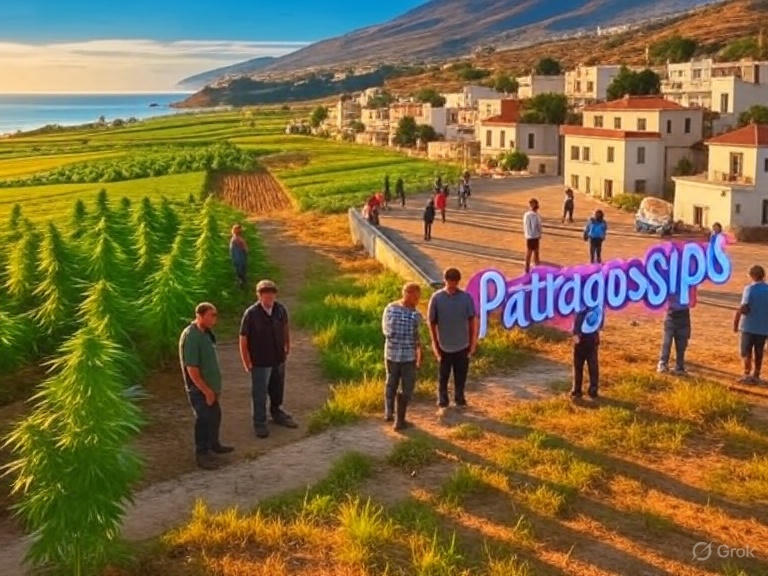In the quiet rural town of Kato Achaia, nestled in western Achaia with its population of around 6,000, the local economy revolves around agriculture, tourism, and the nearby buzz of Patras. But what if this small municipality took a bold step toward modernizing its policies? Legalizing marijuana for recreational use could spark significant changes, though it would likely need national-level reforms given Greece’s centralized drug laws. As of 2025, recreational cannabis is still illegal across the country, with small amounts (up to 5 grams) decriminalized but subject to fines or brief jail time. Medical use has been legal since 2017, with prescriptions rolling out in 2024. While full legalization isn’t imminent, EU trends and Greece’s slow liberalization—like allowing industrial hemp and medical cultivation—hint at possibilities. Drawing from global examples, let’s dive into how this could benefit our local community.
Economic Boost: Jobs, Revenue, and Tourism for a Rural Gem
One of the biggest upsides of legalization is its potential to invigorate local economies, especially in agriculture-heavy spots like Kato Achaia. Legal cannabis could create jobs, generate tax revenue, and open new business avenues. Look at U.S. states like Colorado and California: recreational legalization has raked in billions in taxes ($4.2 billion across legal states in 2023) and supported over 30,000 jobs per state, even in rural areas through farming and processing.
For Kato Achaia, with its fertile lands perfect for olives and potentially hemp or cannabis crops, this means real opportunities:
- Job Creation: Positions in growing, retail dispensaries, or processing plants. Research shows legalization can boost state income by 3% and house prices by 6%, formalizing hidden economies and benefiting small towns. In struggling U.S. small towns, cannabis has revived businesses by drawing growers and tourists, contributing $3.7 billion in national tax revenue in 2021.
- Tax Windfall for Local Needs: Greece could channel this revenue into municipal improvements like better schools or roads. Imagine Kato Achaia funding community projects, similar to New York’s projections of $4.1 billion in economic output and 30,700 jobs from legalization.
- Tourism Surge: As a stepping stone to Peloponnese beaches and historical sites, legal cannabis might attract “cannabis tourists,” boosting local eateries and hotels—just like in lenient European spots such as the Netherlands or Spain. Greece is already eyeing medical cannabis for growth, with estimates of €360 million in investments and 2,250 jobs from production.
Of course, Greece’s national rules might limit municipal moves, and bigger cities could overshadow small towns if not handled right.
Safer Streets and Smarter Policies: Social Gains
Beyond money, legalization could cut crime and enhance safety in places like Kato Achaia, where informal markets quietly operate. Data from legalized regions reveals:
- Reduced Crime: By undermining black markets, it lowers gang activity and arrests. In the U.S., this has saved on justice costs and improved health through regulated, taxed products. For our peaceful town, it could free up police for real priorities instead of minor busts.
- Healthier Alternatives: Regulated cannabis is tested for purity, reducing risks from tainted street supplies. It’s often seen as safer than alcohol, with lower addiction and toxicity rates. Amid Greece’s 2025 crackdowns on alcohol and tobacco, cannabis could emerge as a milder option.
Health Perks: Easier Access for Those in Need
Expanding on Greece’s medical cannabis setup, full legalization could improve health access and research. Key advantages include:
- Therapeutic Support: Simpler access for issues like chronic pain, chemotherapy nausea, or epilepsy. Evidence backs its effectiveness for spasticity, nausea, and pain relief. In rural Kato Achaia, where medical services aren’t always close, local outlets could help elders or farm workers with injuries.
- Broader Public Health: Reducing stigma might encourage more people to seek help, boosting treatment success.
Wrapping Up: A Path Forward for Kato Achaia?
Legalizing marijuana could revitalize Kato Achaia by sparking economic growth, creating jobs, and updating social policies—much like in other small communities worldwide. Yet, it demands smart regulations to curb risks like youth access or overtourism, and Greece’s cautious approach points to slow progress. For now, the focus is on medical and hemp sectors for economic lifts. What do you think, Patras locals? Could this be the spark our region needs? Share your thoughts below!

Η Έλληνες στερούν ακόμα, τέτοια πρόοδο